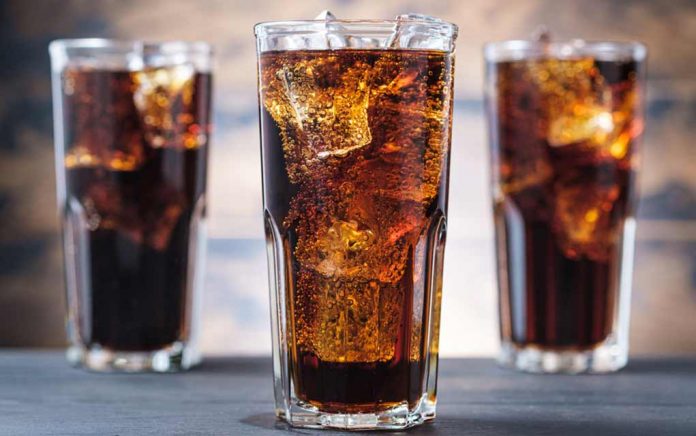
Popular Drink’s TOXIC Truth Revealed
(AscendHealthy.com) – When we think of beloved beverages, some of us might name soda as our favorite. We may even have become very specific about our preferred flavor, asking for a “Coca-Cola® Vanilla Zero Sugar with extra ice cubes” or, perhaps, a “Pepsi® Wild Cherry Vanilla with a squeeze of lime.”
Yum, right? Well, maybe. Learn whether your favorite soda might rank as toxic below.
Is Diet Soda Toxic?
From flavors to color, companies manufacture sodas in many different variations. The biggest difference, though, might be in sugar-free or diet soft drinks versus regular.
Diet soda typically resembles its regular twin in taste. However, sugar-free soft drinks offer two advantages: They are lower in calories and free of sugary ingredients, such as high fructose corn syrup.
Those perks might make us assume that diet soda is safer to drink. But some studies indicate that sugar-free sodas have their own potentially toxic effects:
- Weight Gain: Artificially sweetened beverages have been linked to changes in how our body reacts to sweet flavors, potentially causing our bodies to add pounds.
- Metabolic Syndrome: Research indicates that sugar-free soft drinks may contribute to metabolic syndrome. This condition might increase our risk of type 2 diabetes, stroke, and heart disease.
- Dementia and Stroke: Researchers found that drinking sugar-free beverages might raise our risks of both dementia and stroke. When a study compared drinks sweetened with sugar to artificially sweetened options, only the sugar-free beverages were linked to higher dangers of both dementia and stroke.
Why Are Sodas With Sugar Toxic?
Some experts say that sodas and other sweetened beverages may rank as some of the unhealthiest sources of sugar in our diets. Regular soft drinks are linked to concerns like type 2 diabetes and insulin resistance.
Sodas made with sugar may result in:
- Added Calories: Research shows that when we drink regular soft drinks made with sugar, we take in extra calories without satisfying our hunger.
- Excess Sugar: Researchers have found that too much sugar may result in insulin resistance.
- Prediabetes: Drinking too many sugary beverages like regular sodas might increase our risk of prediabetes.
- Heart Risks: Studies indicate that sugar, a primary ingredient of most soft drinks, may increase our risk of heart conditions.
- Type 2 Diabetes: Researchers have discovered that sugar-sweetened beverages such as soda may raise our risk of type 2 diabetes by more than 25 percent.
Does Your Soda Make the Most Toxic List?
Some sodas might be particularly toxic due to their ingredients. Here’s a tip: When the list of ingredients is longer than the label, it’s probably not a good sign.
Here are some sodas that may be especially hazardous to our health:
- Fanta® Grape: One 12-ounce can of this grape-flavored soda contains 180 calories, 48 grams of carbs, and 48 grams of sugar. Made with high fructose corn syrup, Fanta Grape has even more sugar than a bag of Skittles. The soda is colored with Red 40 food dye, which may be carcinogenic.
- Stewart’s® Black Cherry Wishniak: This cherry soda contains 190 calories and 46 grams of sugar in one 12-ounce can. But it’s not just the high fructose corn syrup that earns this soda its “toxic list” ranking. The soft drink also contains caramel coloring, which is linked to cancer.
- Mountain Dew® Code Red: A tad lower in calories at 170 per 12-ounce can, our beloved Mountain Dew Code Red contains brominated vegetable oil (BVO). BVO is a food additive banned in Europe but permitted in the United States. Exposure to bromine may result in headaches, balance problems, and even memory loss.
- Crush® Pineapple: Pineapple is healthy, right? Well, not when the word “pineapple” is the only actual fruit in the can. One 12-ounce serving of Crush Pineapple contains 190 calories, 51 grams of sugar and soybean oil, which is linked to weight gain.
- Fanta® Mango: At 180 calories and 48 grams of sugar per 12-ounce can, Fanta Mango contains a thickening ingredient known as acacia gum. Side effects may include diarrhea, bloating, and nausea.
- Pepsi Real Sugar: A tad lower in calories (150) and sugar (40 grams) than some of its competitors, a 12-ounce can of Pepsi Real Sugar might seem like a winner. But research has found that “real” sugar is just as harmful as high fructose corn syrup when it comes to our health.
If our favorite soda is on the list above, does that mean we have to ban soft drinks instantly from our lives? Health experts suggest setting a goal of gradually reducing our intake. Consider drinking it on special occasions only and reducing your weekly intake.
Keeping a pitcher of cold water flavored with a squeeze of fresh lemon or lime in the front of the refrigerator may help us make the switch slowly. Green tea and black tea are other healthy options. By becoming aware of the potential risks of our favorite sodas, we have the opportunity to improve our wellbeing. Shifting gradually to better options may empower us to take control of our healthy future.
~Here’s to Your Healthy Ascension
Copyright 2022, AscendHealthy.com




















